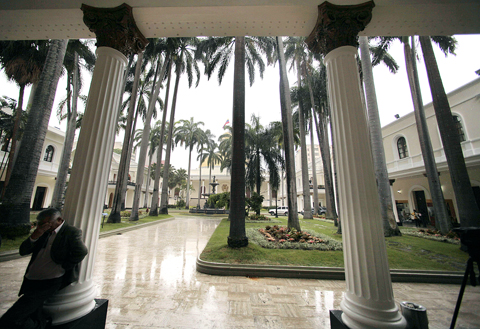Venezuelan lawmakers on Friday approved an election law to redraw voting districts, a step that President Hugo Chavez’s opponents say will give his party a big advantage in next year’s congressional vote.
Ruling party lawmaker Iroshima Bravo downplayed the opposition’s concerns that voting district boundaries could be redrawn to favor the United Socialist Party of Venezuela (PSUV).
“If they have the support of the people, they have nothing to fear,” she said, adding that the legislation was needed because populations had increased or decreased in many municipalities and voting districts should reflect these changes.

PHOTO: AP
The bill easily passed the National Assembly, which is dominated by Chavez allies.
The law authorizes the National Election Council to redraw the boundaries ahead of the election. Four of the council’s five members are widely perceived as pro-Chavez.
Tomas Sanchez, one of a dozen lawmakers who voted against the measure, said he expected the body to “change the district lines, mixing up places where the opposition is stronger with places where the PSUV usually wins, and thereby weaken the opposition.”
The law also changes Venezuela’s proportional representation system in a way that will likely hurt smaller parties.
Under the existing system, 60 percent of lawmakers are elected in single-seat districts, while the remaining 40 percent are elected from a list of candidates chosen by the party.
Currently, if 10 lawmakers are to be elected in a state and one party receives 60 percent of the vote, another 30 percent and a third party 10 percent, then the party that received 60 percent would have six lawmakers elected to the assembly, the runner-up would have three and the minority party would have one.
Under the complex new regulations, seats that previously would have been assigned to minority parties will now be handed over to the top finishers — leaving smaller political groups with little or no representation.
Critics say the law will hurt the coalition of small opposition parties that would challenge Chavez in next year’s congressional polls.
Chavez foes expect to make a strong showing after the opposition made significant gains in November’s gubernatorial and mayoral elections, winning key posts in Caracas and Maracaibo, the country’s second-largest city.
The Venezuelan elections watchdog group Sumate called the law unconstitutional, saying it violates the proportional-representation system outlined in the charter.
“Sumate reminds legislators that they represent the country — not a political tendency,” the group said in a statement.

POLITICAL PATRIARCHS: Recent clashes between Thailand and Cambodia are driven by an escalating feud between rival political families, analysts say The dispute over Thailand and Cambodia’s contested border, which dates back more than a century to disagreements over colonial-era maps, has broken into conflict before. However, the most recent clashes, which erupted on Thursday, have been fueled by another factor: a bitter feud between two powerful political patriarchs. Cambodian Senate President and former prime minister Hun Sen, 72, and former Thai prime minister Thaksin Shinawatra, 76, were once such close friends that they reportedly called one another brothers. Hun Sen has, over the years, supported Thaksin’s family during their long-running power struggle with Thailand’s military. Thaksin and his sister Yingluck stayed

Kemal Ozdemir looked up at the bare peaks of Mount Cilo in Turkey’s Kurdish majority southeast. “There were glaciers 10 years ago,” he recalled under a cloudless sky. A mountain guide for 15 years, Ozdemir then turned toward the torrent carrying dozens of blocks of ice below a slope covered with grass and rocks — a sign of glacier loss being exacerbated by global warming. “You can see that there are quite a few pieces of glacier in the water right now ... the reason why the waterfalls flow lushly actually shows us how fast the ice is melting,” he said.

‘ARBITRARY’ CASE: Former DR Congo president Joseph Kabila has maintained his innocence and called the country’s courts an instrument of oppression Former Democratic Republic of the Congo (DR Congo) president Joseph Kabila went on trial in absentia on Friday on charges including treason over alleged support for Rwanda-backed militants, an AFP reporter at the court said. Kabila, who has lived outside the DR Congo for two years, stands accused at a military court of plotting to overthrow the government of Congolese President Felix Tshisekedi — a charge that could yield a death sentence. He also faces charges including homicide, torture and rape linked to the anti-government force M23, the charge sheet said. Other charges include “taking part in an insurrection movement,” “crime against the

Residents across Japan’s Pacific coast yesterday rushed to higher ground as tsunami warnings following a massive earthquake off Russia’s far east resurfaced painful memories and lessons from the devastating 2011 earthquake and nuclear disaster. Television banners flashed “TSUNAMI! EVACUATE!” and similar warnings as most broadcasters cut regular programming to issue warnings and evacuation orders, as tsunami waves approached Japan’s shores. “Do not be glued to the screen. Evacuate now,” a news presenter at public broadcaster NHK shouted. The warnings resurfaced memories of the March 11, 2011, earthquake, when more than 15,000 people died after a magnitude 9 tremor triggered a massive tsunami that